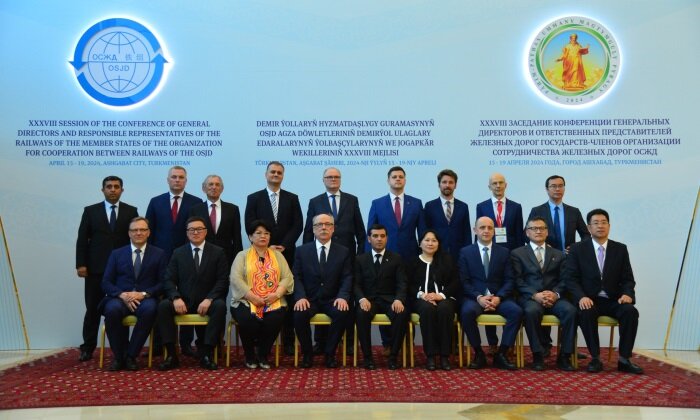Professor Murad Khaitov spoke about the key functions of the globally recognized status of positive neutrality of Turkmenistan.
 The regular author of the online edition CentralAsia.news, Doctor of Law, Professor, Honored Lawyer, the Honorary Elder of Turkmenistan Murad Khaitov presented a deep story about the status of positive neutrality of Turkmenistan. The scientist reveals the historical background, modern relevance, and real positive fruitfulness of the balanced policy of Turkmenistan.
The regular author of the online edition CentralAsia.news, Doctor of Law, Professor, Honored Lawyer, the Honorary Elder of Turkmenistan Murad Khaitov presented a deep story about the status of positive neutrality of Turkmenistan. The scientist reveals the historical background, modern relevance, and real positive fruitfulness of the balanced policy of Turkmenistan.
The country of the most ancient civilizations
The creation of the institution of neutrality has its deep historical roots. It has been formed over several centuries, but was greatly developed in the 18th, and, especially, in the late 19th — early 20th centuries. Initially, neutrality was considered as the right of states to neutral trade. Its main canons were first codified in the 11th-14th centuries in the Spanish collection of maritime customs («Consolato Del Mare»). Then, this principle was adopted as a basis by almost all continental powers. Initially, neutrality was considered as an institution of humanitarian law (the law of armed conflicts). The famous essay of the Dutch jurist Hugo Grotius «The Law of War and Peace» («De jure belli ac pacis», 1623-1625), the treatise of the Swiss Emer de Vattel «The Law of Nations, or Principles of the Law of Nature, Applied to the Conduct and Affairs of Nations and Sovereigns» (1758) were the basis of the corresponding phenomenon.
Turkmenistan is a country of ancient civilizations that have made a great contribution to the development of world culture, the heart of the Great Silk Road. Documents and written messages of ancient authors, as well as domestic historians, testify to the broad political and diplomatic cooperation of the ancestors of the Turkmens with the Chinese, the Romans. As a result, a unique system of political balance was formed in the vast territories of Asia. In 69 BC, Rome and Parthia signed a treaty securing neutrality for Parthia. It was the first legally formalized neutral status of the state in history, as noted by Russian scientists — historians.
For a long time, the structure of neutrality remained unchanged. However, over a long historical period, it has undergone a noticeable evolution. Under the influence of various factors, neutrality as a scientific category, as the most important institution of international law, developed and improved, combining both historical roots and modern traditions. The basic foundation of neutrality has historically evolved as a political phenomenon. At the moment, the status of neutrality is highly developed not only in international law but also in the domestic legal system and is enshrined in normative legal acts that have the highest legal force, serving as the core basis of the legal system of a particular state.
Inherent peacefulness
The main condition for the strength, progress, prosperity, and well-being of the ancient and medieval Turkmen states was their wide openness to the world, commitment to constant dialogue with other countries and peoples. Openness, readiness for cooperation, susceptibility to everything new, the absence of any manifestations of xenophobia, natural peacefulness, tolerance, and respect for other people’s opinions. These features of the national mentality, formed over millennia, have become a kind of generic characteristics of the Turkmen people, which they managed to preserve and leave a legacy to the present generations.
Besides, history has taught the Turkmen people to respect the opinions of others, no matter how different it may seem, to compromise in the name of peace and tranquility, and also to value national unity and good neighborliness. All these features became decisive in choosing a national model of the country’s socio-political structure and formed the basis for the content of its neutral foreign policy course.
Official status, twice confirmed by the UN
Turkmenistan, first becoming the holder of the status of a permanently neutral state on December 12, 1995, and then reaffirming it on June 3, 2015, has become the focus of attention of the international community of states. And this is no coincidence. The fact is that the legitimacy and validity of this historical and strategic choice are demonstrated by the fact that Turkmenistan has become one of the few young independent states that has made a smooth transition from the previous state-building system to a qualitatively new state. Turkmenistan has become an example of social and political stability and interethnic harmony, further development and strengthening of good relations with the states of the region.
The choice of a neutral model by Turkmenistan as the basis for a practical foreign policy course, state, and social development is quite logical. The neutral model is determined by the very history of our people. It was a history that predetermined the choice of the political course by independent Turkmenistan, which allowed us to preserve ourselves as a single nation, preserve the Turkmen statehood, sovereignty, and our identity. Today, continuing the historical traditions of its people, our state builds its relations with other states based on respect for culture, traditions, and customs, the historical memory of their peoples, widely develops mutually beneficial and equal political, economic, and humanitarian relations with them.
Harmony of form and content
The Turkmen people, who created an optimal model of the state in the past, continue to remain faithful to their line in the 21st century. Turkmenistan, being a full-fledged subject of the world community, is committed to the principles of permanent neutrality, non-interference in the internal affairs of other countries, refusal to use force, and participation in military blocs and alliances in foreign policy. Also, for the first time in the new version of the Constitution, a separate norm has been introduced that enshrines the status of neutrality (Article 2). Unlike all previous editions of the Basic Law, it proclaims for the first time that the neutrality status of Turkmenistan is recognized by the world community, then — the provisions of the UN General Assembly Resolutions «Permanent Neutrality of Turkmenistan», supported on December 12, 1995, No. 50/80 A (RES/50/80) by 185 states, and on June 3, 2015, No. 69/285 (RES/69/285) — already 193 UN members (Article 2).
The neutrality of Turkmenistan is recognized and that is confirmed by the UN General Assembly Resolution «Permanent Neutrality of Turkmenistan» (December 12, 1995), the Islamabad Declaration following the third meeting of the heads of states and government of the countries of the Organization for Economic Cooperation (March 15, 1995), the final document of the 11th Conference of Heads of State and Government of the Non-Aligned Movement (October 20, 1995, Cartagena, Colombia). Considering the form, neutrality is permanent, not limited in time and acting both in wartime and in peacetime, but within the content, it is positive or constructive, which implies an active position of states in maintaining peace and stability, developing relations of friendship and cooperation between states.
The proclamation of Turkmenistan by the UN as a permanently neutral state is an important innovation in international law. Until this moment, there was no such practice. Turkmenistan became the first and only neutral state in the world, unanimously recognized by the international community. The UN General Assembly resolutions on the permanent neutrality of Turkmenistan have become a kind of precedent in international law. Such unique documents have been adopted for the first time in the entire history of the activities of the entire international community of nations. Support for neutrality is a rare phenomenon in the more than half-century history of this international organization.
Proposals of Turkmenistan are relevant responses to modern challenges
The initiatives of the President of Turkmenistan Gurbanguly Berdimuhamedov in the modern period become a significant factor in international life. The proposals of the head of the state are aimed at creating a qualitatively new system of international legal measures, regional security, energy security, environmental protection and ecology, anticipation, and neutralization of conflict situations in Central Asia. At the same time, they call for the implementation of large transnational projects of an economic and humanitarian nature. They are components of the foreign policy of Turkmenistan, exerting a positive influence on the nature and content of interstate relations in the region and beyond.
An important aspect of Turkmenistan’s foreign policy is the creation of favorable conditions for ensuring global energy security. On the initiative of Turkmenistan and with the support of all Central Asian states, a Regional Center for Preventive Diplomacy for Central Asia was established by the UN decision. Ashgabat was chosen to host the headquarters of this Center. Taking into account the achieved successes and initiatives of Turkmenistan as a neutral state in the international arena, on February 2, 2017, at the 71st session, the UN General Assembly declared December 12 — International Day of Neutrality.
Speaking of the essence and content of Turkmenistan’s neutrality, the head of the state Gurbanguly Berdimuhamedov in his speech at a meeting with the deputies of the Mejlis of Turkmenistan on February 11, 2020, noted that «neutrality is our great asset. Its value is recognized by the international community. It is a doctrine that ensures the triumph of peace and friendship, humanism and goodwill, cooperation, and progress. ‚
A quarter of a century is a sufficient period to assess the viability of the Turkmen state foreign policy doctrine, to be convinced of the correctness of the choice made.





